
Emmanuelle Seigner is a French actress and singer. She is known for her roles in The Diving Bell and the Butterfly (2007), The Ninth Gate (1999) and Frantic (1988). She has been nominated for a César Award for Best Actress for Venus in Fur (2013), and for two César Awards for Best Supporting Actress in Place Vendôme (1998) and La Vie en Rose (2007). She has been married to Polish film director Roman Polanski since 1989.

The Deauville American Film Festival is a yearly film festival devoted to American cinema, which has taken place since 1975 in Deauville, France.
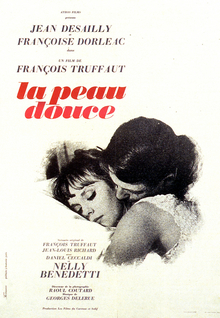
The Soft Skin is a 1964 romantic drama film co-written and directed by François Truffaut and starring Jean Desailly, Françoise Dorléac, and Nelly Benedetti. Written by Truffaut and Jean-Louis Richard, it is about a married successful writer and lecturer who meets and has an affair with a flight attendant half his age. The film was shot on location in Paris, Reims, and Lisbon, and several scenes were filmed at Paris-Orly Airport. At the 1964 Cannes Film Festival, the film was nominated for the Palme d'Or. Despite Truffaut's recent success with Jules and Jim and The 400 Blows, The Soft Skin did not do well at the box office.

A Very Long Engagement is a 2004 romantic war drama film, co-written and directed by Jean-Pierre Jeunet and starring Audrey Tautou, Gaspard Ulliel and Marion Cotillard. It is a fictional tale about a young woman's desperate search for her fiancé who might have been killed during World War I. It was based on the 1991 novel of the same name by Sébastien Japrisot. The film is a co-production between France and the United States. It was released theatrically in France on 27 October 2004 and in the United States on 26 November 2004.
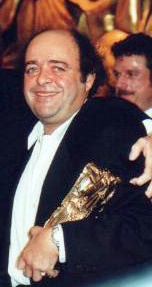
Jacques Villeret was a French actor, best known internationally for his role as François Pignon in the comedy Le Dîner de Cons. During his career, he earned many awards including the prestigious medal and title of Chevalier de la Légion d'Honneur.

Army of Shadows is a 1969 Franco-Italian World War II suspense-drama film written and directed by Jean-Pierre Melville, and starring Lino Ventura, Paul Meurisse, Jean-Pierre Cassel, and Simone Signoret. It is an adaptation of Joseph Kessel's 1943 book of the same name, which mixes Kessel's experiences as a member of the French Resistance with fictional versions of other Resistance members.

The Woman Next Door is a 1981 French romantic drama film directed by François Truffaut. Reminiscent of the medieval legend of Tristan and Iseult but set among young middle-class people in a provincial city, it tells the story of a fatal romance between a loving husband and the attractive woman who moves in next door. The last of Truffaut's serious films, being followed by the more light-hearted Vivement dimanche!, it was the 39th highest-grossing film of the year, with a total of 1,087,600 admissions in France.

Venus Beauty Institute, also known as Venus Beauty, is a 1999 French romantic comedy. The story centers on three employees of a beauty parlor and their search for love and happiness. The film is directed by Tonie Marshall. It stars Nathalie Baye, Bulle Ogier, Samuel Le Bihan, Jacques Bonnaffé, Mathilde Seigner, Audrey Tautou, Robert Hossein, Claire Denis, Micheline Presle, Emmanuelle Riva and Elli Medeiros.
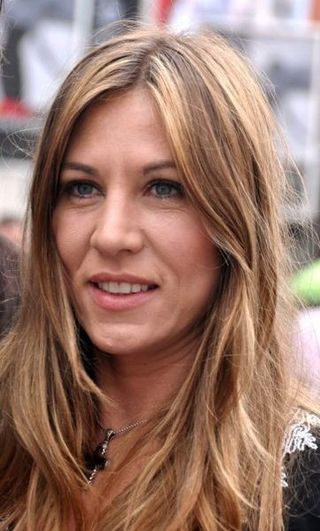
Mathilde Seigner is a French actress.
Corps à corps is a 2003 film, written by Arthur-Emmanuel Pierre and music by Sarry Long. Set in contemporary France, the film was produced by Carrère Groupe and Anne Regard and starred Emmanuelle Seigner and Philippe Torreton.
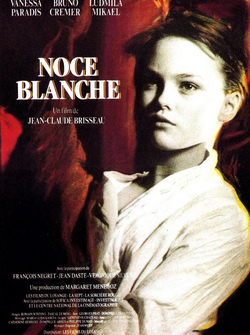
Noce Blanche is a 1989 French romantic drama film written and directed by Jean-Claude Brisseau. It stars Vanessa Paradis, Bruno Cremer and Ludmila Mikaël, with François Négret, Jean Dasté and Véronique Silver.

Catherine Jacob is a French film and theatre actress who has won a César Award for her role in Life Is a Long Quiet River (1988), and was nominated for Best Supporting Actress in Tatie Danielle (1990), Merci la vie (1991) and Neuf mois (1994). She has been two-time president of the Lumières Award. She is known for her voice and her charisma.

Tous les matins du monde is a 1991 French film based on the book of the same name by Pascal Quignard. Set during the reign of Louis XIV, the film shows the musician Marin Marais looking back on his young life when he was briefly a pupil of Monsieur de Sainte-Colombe, and features much music of the period, especially that for the viola da gamba. The title of the film comes from words of the narrator in Quignard's novel.

Criminal Lovers is a 1999 psychological thriller and horror film by French director François Ozon. It is a modern retelling of Hansel and Gretel.

A Lover's Return is a 1946 French drama film directed by Christian-Jaque and starring Louis Jouvet, Gaby Morlay and François Périer. It was shot at the Cité Elgé in Paris and on location in Lyon. The film's sets were designed by the art director Pierre Marquet. It was entered into the 1946 Cannes Film Festival in September before its Lyon premiere and general release the following month.
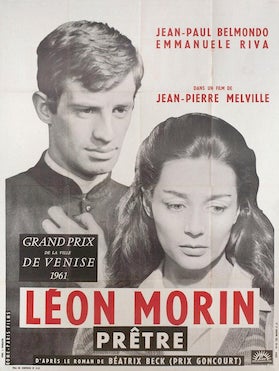
Léon Morin, Priest is a 1961 French drama film directed by Jean-Pierre Melville. It was adapted by Melville from Béatrix Beck's novel The Passionate Heart, which won the Prix Goncourt in 1952. Set during WWII in Occupied France, the film stars Emmanuelle Riva as a jaded, lapsed Catholic mother and widow of a Jewish husband, who finds herself falling in love with a young, altruistic priest, played by Jean-Paul Belmondo.

Détective is a 1985 French crime film directed by Jean-Luc Godard. It was entered into the 1985 Cannes Film Festival. The film won the Georges Delerue Award for Best Soundtrack/Sound Design at Film Fest Gent in 1985.

La Marie du port is a 1950 French crime film directed by Marcel Carné and starring Jean Gabin, Blanchette Brunoy and Nicole Courcel. The screenplay was written by Georges Ribemont-Dessaignes and Jacques Prévert, based on the 1938 novel of the same title by Georges Simenon. The music score is by Joseph Kosma and the cinematography by Henri Alekan. It was made at the Saint-Maurice Studios in Paris and on location around Cherbourg in Normandy. The film marked a comeback for Carné after the poor reception of his previous film Gates of the Night in 1946 and several subsequent unsuccessful attempts to launch projects.

The Common Man is a 1975 French drama film directed by Yves Boisset and produced by Sofracima. It was entered into the 25th Berlin International Film Festival, where it won the Silver Bear - Special Jury Prize. In the United States, the film was released under the title Rape of Innocence.


















